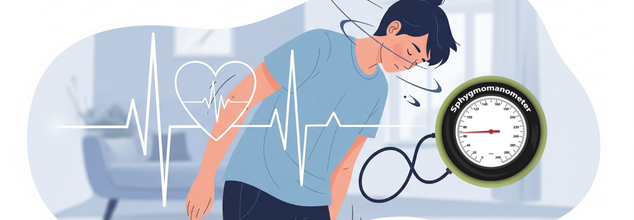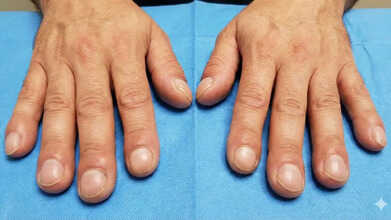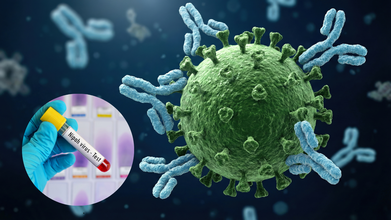- Health Conditions A-Z
- Health & Wellness
- Nutrition
- Fitness
- Health News
- Ayurveda
- Videos
- Medicine A-Z
- Parenting
Can A Sudden Drop In Blood Pressure Lead To Death?

Credits: Health and me
When we hear about blood pressure, it's often in the context of hypertension — the "silent killer" that increases long-term risk for heart attacks and strokes. But there’s another side to the story that can be just as dangerous, if not more immediately deadly. Blood pressure is more than just a pair of numbers on your doctor’s chart—it’s a vital sign of how well your heart and blood vessels are delivering life-sustaining oxygen and nutrients to every organ in your body.
While most people are familiar with the risks of high blood pressure, the dangers of a sudden drop in blood pressure, or acute hypotension, are often underestimated and sometimes misunderstood but can such a drop be fatal? A sudden drop in blood pressure, known as acute hypotension. While occasional dizziness or lightheadedness may seem harmless, in some cases, a rapid decline in blood pressure can trigger a chain reaction that may ultimately result in organ failure or even death.
Also Read: Japanese Diet for Depression: How Washoku Foods Can Improve Mental Health
What Happens When Blood Pressure Plummets?
Blood pressure is measured as two numbers: systolic (the pressure as your heart beats) and diastolic (the pressure as your heart rests between beats). According to the National Heart, Lung and Blood Institute, a normal reading for healthy adults is under 120/80 mmHg. When blood pressure falls below 90/60 mmHg, it’s considered low, or hypotension.
A sudden decrease—even a drop of just 20 mmHg in systolic pressure—can cause symptoms like dizziness, confusion, and fainting. More severe drops can be catastrophic, as Dr. S.S. Sibia, Cardiologist & Director at Sibia Medical Center Ludhiana, explains, "A sudden loss of blood pressure, or acute hypotension, can actually lead to death. Blood pressure helps deliver oxygen and nutrients to vital organs like the brain, heart, and kidneys. If BP suddenly falls, the body may not be in a state to maintain regular blood flow, leading to severe complications."
What Causes The Blood Pressure To Drop Suddenly?
There are several causes of acute hypotension, and they often intersect. Here are the most common physiological triggers:
Also Read: National Doctors Day 2025: Why July 1 Honors Indian Physicians
Hypovolemia
A drop in blood volume due to bleeding, vomiting, or dehydration
Decreased cardiac output
When the heart fails to pump enough blood, often due to a massive heart attack
Vasodilation
Widening of blood vessels in conditions like sepsis or a severe allergic reaction (anaphylaxis)
Hypotensive syndrome
A term used when multiple factors contribute to a sudden drop in blood pressure
Dr. Yogendra Singh Rajput, Associate Director of Cardiology at Marengo Asia Hospitals, Gurugram, notes, "The most common cause of sudden drop in blood pressure is massive heart attack. Any massive heart attack of right side or a right coronary artery can lead to a sudden drop... ultimately the patient can die." He adds that internal bleeding — such as from a ruptured gastric ulcer — or extreme dehydration from vomiting or loose motions, are other serious culprits.
Symptoms of Sudden Low Blood Pressure
When blood pressure drops quickly, the body doesn't get enough oxygen, especially the brain. That’s why many of the early symptoms are neurologic in nature:
- Dizziness or fainting
- Confusion or disorientation
- Blurred vision
- Lightheadedness
- Heart palpitations
- Cold, clammy skin
- Headache
- Rapid breathing
These signs may appear suddenly, sometimes with no warning. In severe cases, the person may lose consciousness or go into shock, a life-threatening condition. "Warning symptoms include dizziness, confusion, blurred vision, fainting, and cold or sweaty skin," says Dr. Sibia. "Some may ignore these symptoms, assuming they are insignificant, but ignoring them can delay treatment and worsen outcomes."
"Acute hypotension is a sudden and severe drop in blood pressure that can be deadly if not treated right away," says Dr. Rahul Mehrotra, Chief - NIC & Clinical Cardiology, Artemis Hospitals. "When BP gets too low, these organs don't get enough blood, which can lead to organ failure and even death." Dr. Mehrotra highlights the top medical emergencies that often result in sudden hypotension:
- Major bleeding (from trauma or internal injuries)
- Heart attack
- Sepsis, a life-threatening infection
- Anaphylaxis, a severe allergic reaction
- Severe dehydration
He further emphasizes that not all cases of low BP are dangerous. "When blood pressure is low but not too low, it usually isn't a big deal for healthy people. But a sudden and severe drop in blood pressure should never be ignored."
How Fast Can A Drop In Blood Pressure Turn Fatal?
The progression from a sudden drop in blood pressure to life-threatening complications can be rapid. When blood flow to vital organs is interrupted, shock can develop within minutes, leading to organ failure and, if untreated, death.
Dr. Yogendra explains, "Sometime a sudden drop in the blood pressure may be because of sudden loss of fluid inside the body like severe dehydration due to loose motions, due to excessive vomiting, due to excessive blood loss, due to internal organ injury or due to internal blood loss in the form of rupture of gastric ulcer. So there are many things which can cause drop in the blood pressure and ultimately patient may succumb to death."
When Is a Low Blood Pressure considered an Emergency?
While some people live with chronically low blood pressure without symptoms, a sudden and significant drop—especially with symptoms—should always be treated as a medical emergency. Dr. Mehrotra emphasizes, "You should never ignore a sudden and severe drop in blood pressure. IV fluids, medications, and emergency procedures are all examples of timely medical care that can save lives. In short, a sudden drop in blood pressure can be deadly if you don't get help. Being able to see the warning signs early can make a big difference."
While a slight drop in blood pressure can occur from something as benign as standing up too fast, a sudden and unexplained dip should not be taken lightly. Acute hypotension is not just about numbers on a monitor — it’s about how the body responds when critical systems are deprived of oxygen-rich blood.
As Dr. Rajput puts it bluntly, "Yes, a sudden drop in blood pressure can cause sudden death." While mild, brief episodes may cause only dizziness, a rapid and significant decline can be life-threatening, especially if it signals a heart attack, severe bleeding, sepsis, or anaphylaxis. Recognizing the symptoms and seeking immediate medical help can be the difference between recovery and tragedy.
Disclaimer: If you or someone around you experiences sudden and unexplained symptoms of low blood pressure, treat it as a true emergency. Always consult a qualified healthcare professional for diagnosis, treatment, or concerns about your health.
Lung Cancer Symptoms Can Show Up On Your Fingers: Here’s What To Look For

Credits: Canva
Lung cancer is especially dangerous because its symptoms often do not appear until the harmful cells have already spread through the body. However, there are some early warning signs you might be able to spot. Common indicators include breathlessness, wheezing, and a persistent cough that may bring up blood or mucus. While lung cancer is typically linked to respiratory problems like a chronic cough, shortness of breath, or chest discomfort, experts note that noticeable changes in your fingertips and nails can sometimes serve as early alerts for this potentially serious disease.
What Is Lung Cancer?
Lung cancer is a malignant growth that begins in the tissues of the lungs, usually from DNA damage in the cells lining the airways, which then grow uncontrollably to form tumors. Smoking is a major contributor, but other factors such as exposure to radon, asbestos, or inherited genetic conditions can also play a role.
Symptoms often include a persistent cough, chest pain, and difficulty breathing. Lung cancer is mainly classified into two types: Non-Small Cell Lung Cancer (NSCLC) and Small Cell Lung Cancer (SCLC), according to the Cleveland Clinic.
Types Of Lung Cancer
Although many cancers can develop in the lungs, the term “lung cancer” usually refers to two main types: non-small cell and small cell lung cancer.
Non-Small Cell Lung Cancer (NSCLC)
NSCLC is the most common form, accounting for more than 80% of lung cancer cases. Common subtypes include adenocarcinoma and squamous cell carcinoma, while adenosquamous carcinoma and sarcomatoid carcinoma are less frequent forms of NSCLC.
Small Cell Lung Cancer (SCLC)
SCLC tends to grow more quickly and is more challenging to treat than NSCLC. It is often detected as a small tumor that has already spread to other areas of the body. Types of SCLC include small cell carcinoma (also known as oat cell carcinoma) and combined small cell carcinoma.
Lung Cancer Symptom On Fingers
Have you ever pressed your fingernails together and noticed a small diamond-shaped space of light? If that gap is missing, it could be a sign of finger clubbing, a condition where the ends of the fingers swell, which may indicate lung cancer.
This change occurs gradually, starting with the base of the nail becoming soft. Next, the skin around the nail bed may appear shiny, followed by the nails curving more than usual when viewed from the side.
Eventually, the tips of the fingers can enlarge and swell as fluid builds up in the soft tissue. While a missing diamond-shaped gap between your nails doesn’t automatically mean you have lung cancer, it can be a warning sign. If you notice this, it’s wise to consult your doctor.
What Are The Warning Signs Of Lung Cancer?
Lung cancer can present differently in every individual. Some people show multiple symptoms, while others may have none.
Key signs to watch for include:
- Swelling in the face or neck
- A cough that changes or worsens
- Frequent chest infections
- Shortness of breath
- Chest or shoulder pain
- Wheezing
- Coughing up blood or blood-stained phlegm
- Hoarseness
- A persistent cough lasting three weeks or longer
- Unexplained fatigue or low energy
Doctor Debunks Five Myths Around Nipah Virus

Credits: Canva
West Bengal is witnessing a Nipah virus outbreak, with five cases of the disease detected in just one week. In an age where information travels faster than verification, fear often fills the gaps left by facts. Each time the Nipah virus makes headlines, anxiety spikes, driven by rumors and alarming social media claims. Doctors say this reaction is understandable but unnecessary. Nipah is a serious illness, but it is not an uncontrollable mystery. Understanding what is true and what is not can help people stay cautious without slipping into panic.
Dr Satya Ranjan Sahu, Senior Consultant in Pulmonology at Narayana Hospital, Gurugram, explains that misinformation can sometimes be more dangerous than the virus itself. Here are some of the most common myths around Nipah virus, and what medical science actually says.
Myth 1: Nipah virus spreads easily through the air
Many people assume Nipah spreads like COVID-19 or seasonal flu. That is not accurate. Nipah does not spread through the air over long distances. Most infections occur after close contact with infected animals or through exposure to bodily fluids of an infected person, such as saliva or respiratory secretions, usually during caregiving. Human-to-human transmission is possible, but it typically requires prolonged and unprotected close contact.
Also Read: Nipah Virus Case Detected In Two Nurses From West Bengal
Myth 2: Getting infected always leads to death
The severity of Nipah has led to the belief that infection equals death. Doctors strongly refute this. While Nipah can be life-threatening, not every case is fatal. Many patients recover, especially when the infection is identified early and medical care begins promptly. Early diagnosis, hospital monitoring, and supportive treatment can significantly improve outcomes.
Myth 3: There is no treatment, so nothing can help
It is true that there is no specific antiviral drug approved to cure Nipah virus. However, this does not mean patients cannot be treated. Medical care focuses on managing symptoms, supporting breathing, maintaining hydration, and preventing complications. With proper hospital care, patients can be stabilised and supported through the illness. Calling Nipah untreatable often discourages people from seeking timely medical help, which can be dangerous.
Myth 4: Without a vaccine, prevention is impossible
The absence of a vaccine can make people feel helpless, but prevention does not depend on vaccines alone. Simple steps are highly effective. Maintaining good hygiene, avoiding contact with sick animals, using protective gear while caring for infected individuals, and following public health advisories all reduce risk. Doctors stress that informed and cautious behavior remains one of the strongest tools against Nipah.
Read: Unique Symptoms Of Nipah Virus Found In West Bengal And How Long Infection Now Last
Myth 5: All fruits are unsafe to eat
Fruit bats are natural carriers of the Nipah virus, which has led to widespread fear around fruit consumption. Doctors clarify that fruits are not automatically dangerous. Properly washed, peeled, and hygienically handled fruits are generally safe to eat. Most human infections have been linked to close contact with infected animals or people, not routine fruit consumption.
What doctors want people to remember
Nipah virus is serious, but it is not as easily spread or as hopeless as many believe. Early symptoms may include fever, headache, muscle pain, or vomiting, and in some cases progress to breathing or neurological problems. Seeking medical care at the first sign of symptoms can save lives. Health experts urge the public to rely on verified information from trusted medical sources and avoid spreading unconfirmed claims.
During outbreaks, calm awareness matters. Separating myths from medical facts allows communities to respond with care, responsibility, and confidence rather than fear.
Measles Symptoms Explained: Can The Infection Be Deadly?

Credits: Canva
As measles continues to spread across the United States, with recent case numbers climbing to their highest level in 33 years, growing numbers of Americans are becoming concerned about how at risk they may be.
Health officials in Philadelphia confirmed a potential measles exposure at Philadelphia International Airport and several public transport locations across the city in early January. The Centers for Disease Control and Prevention has also flagged earlier measles outbreaks across Pennsylvania, New Jersey, and New York City.
Adding to the concern, infectious disease tracker BMJGroup reported that measles cases recorded in 2025 are the highest seen since at least 1992.
Against this backdrop, it is important to understand whether measles can be fatal and to recognise the symptoms that should not be ignored.
Is Measles Deadly?
Yes, measles can be deadly and carries a significant risk of death, according to the Centers for Disease Control and Prevention.
“Measles can lead to serious health complications, including pneumonia, inflammation of the brain known as encephalitis, and death,” the CDC states. “Between one and three out of every 1,000 people infected with measles will die. Around one in five people with measles will require hospital care, and one in every 20 children with measles develops pneumonia, which is the leading cause of measles-related deaths in young children.
“One in every 1,000 people with measles will experience brain swelling, which can result in permanent brain damage.”
Measles Symptoms Develop In Three Stages
According to the Mayo Clinic, measles symptoms usually appear in three distinct stages.
Stage 1: Incubation period (10 to 14 days)
During this phase, there are typically no noticeable or warning symptoms.
Stage 2: Early symptoms begin
Symptoms at this stage may include a dry cough, fever, red and inflamed eyes known as conjunctivitis, a runny nose, and a sore throat.
Stage 3: Acute illness and rash
“In the third stage, a rash begins to develop, usually starting on the face. Small white spots called Koplik spots may appear inside the mouth two to three days after symptoms first appear,” the Mayo Clinic explains. “The measles rash typically shows up three to five days after the initial symptoms.
“Over the following days, the rash spreads to the arms, torso, and legs. Alongside the rash, fever often rises rapidly and can exceed 105 degrees Fahrenheit,” the guidance continues. “Eventually, the fever subsides, and the rash fades from the body starting at the head and moving downward.”
How Do You Treat Measles?
There is no specific antiviral medication that cures measles. However, people who have not previously been vaccinated may still be able to reduce the severity of illness if action is taken quickly after exposure.“If individuals aged six months or older are exposed to measles and do not have immunity from prior infection or vaccination, they can receive the measles vaccine within three days of contact with the virus,” the Mayo Clinic advises. “After vaccination, quarantine at home is not required.
“For children up to 11 months old who are exposed and are not immune, a dose of antibodies known as immune globulin can be given within six days of exposure to help the body fight the infection.”
Receiving this antibody treatment requires a 21-day quarantine period.
© 2024 Bennett, Coleman & Company Limited

